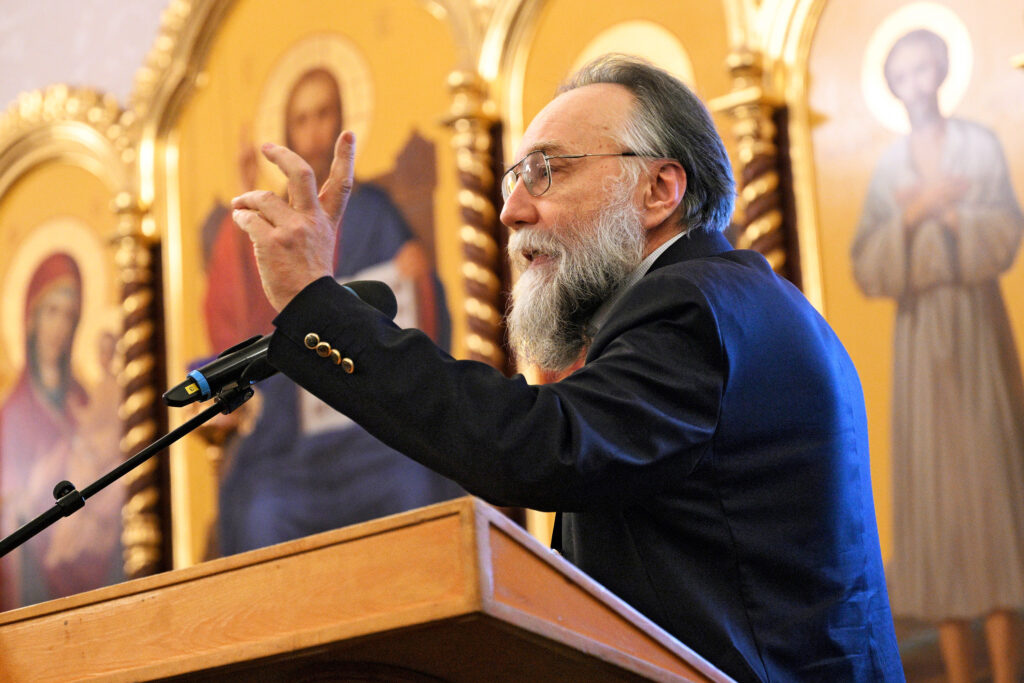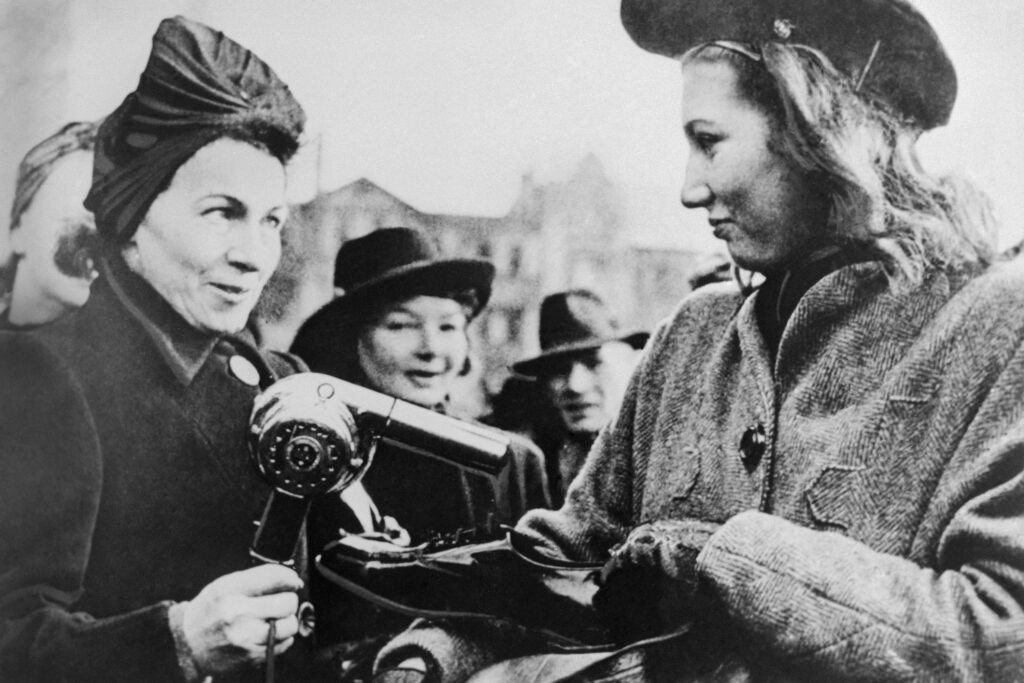The Moral Economy of the Far Right

Of all the criticisms of capitalism, one of the most enduring is the idea that the economy should be moral. French utopian socialists envisaged a solidarity economy in which the hard-working received the true value of their labor. In England, the Chartist slogan of “a fair day’s wage for a fair day’s work” still reverberates today. Even Marx, famously seen as an amoral critic of capitalism, contrasted ancient and modern notions of the economy in terms that are surely, at least in some respects, moral: “The ancient conception, in which man always appears (in however narrowly national, religious, or political a definition) as the aim of production, seems very much more exalted than the modern world, in which production is the aim of man and wealth the aim of production.”1
But what if one’s morality extends not to “man” or human beings in general, as it did for Marx, but instead to a group limited by national, civilizational, or racial characteristics? Is it not equally possible to envision a moral economy that advocates fair pay, fair trade, social solidarity, and reciprocity within the confines of an identity group and the apparently natural division of labor that structures that group? In fact, today it is the far right that is among the most visible proponents of the idea of a moral economy.
For European New Right thinkers such as the French political philosopher Alain de Benoist, the French theorist and journalist Guillaume Faye, and the Russian political philosopher Alexander Dugin, globalization has ripped the moral heart out of the economy. It has uprooted systems of production and circulation from their native soils, allocating them to the portfolios of transnational elites. In doing so, it has sliced away at the natural bonds that once held communities together: their organic social security systems, ethics of exchange, and traditional work practices. Drained of meaning and spiritual purpose, economies have been reduced to impersonal mechanisms driven only, in the words of de Benoist, by “the general submission of the world to the market rationale, the reign of quantity, the rationale of profit, the axiomatic force of interest, and the transformation of all values into merchandise.”2
This is a strange kind of anti-capitalism. In the first place, it is openly anti-egalitarian. For these thinkers, equality is itself a capitalist concept, an outgrowth of the very reign of quantity and commensurability they seek to overcome. “What is best about equality,” writes de Benoist, ”is actually known as ‘reciprocity’ and includes mutual assistance, specific solidarity, and a system of gifts and counter-gifts.”3 It’s easy to see why reciprocity is a concept so favored by the far right: With its suggestion of concrete, voluntary, and individualized forms of exchange, reciprocity preserves distinctions between parties in the exchange relation—and indeed the whole system of places in which parties are differentially situated—yet it also casts such a relation as an ethical one. In a patriarchy, men can behave chivalrously as a form of reciprocity for women’s submission. In a slave system, masters might imagine themselves and their slaves as behaving according to a principle of mutual assistance. Indeed, gestures of what could pass as solidarity between husband and wife, or master and slave, are the oils that give durability to the whole structure.
Injecting morality back into the economy is therefore not seen, by the European New Right, as requiring the abolition of class. On the contrary, class is morality. Classes are, as in the corporatist imaginary, distinct and complementary facets of the social body, working together like organs in a living being. Mussolini’s Charter of Labor of 1927 described the Italian nation as “an organism having ends, life, and means of action superior to those of individuals, singly or in groups, of which it is composed.”4 Similarly, the moral economy of the European New Right is, in the words of Faye, an “organic economy” based “on the precept that the economy ought to function as a living organism, hierarchical and harmonious.”5 What is immoral instead is any project that aims to engineer a society of equals, which in doing so can only destroy their differences. But isn’t equality a project of guaranteeing conditions for our individual and collective flourishing, and doesn’t such flourishing take place in inevitably different ways? No. The matter is simple: Equality means uniformity, and a society without classes is necessarily one trapped in what de Benoist calls “the ideology of sameness.”6
This is, further, a kind of anti-capitalism that seems less perturbed by capitalism’s production of hunger, unfulfilled needs, or unnecessary suffering than by its effects as an aesthetic or cultural regime. In this respect, the European New Right’s critique of capitalism finds its roots in a much older personal hatred of the bourgeoisie expressed by aristocratic critics of capitalism and utopian socialists alike. The bourgeoisie is seen as a uniquely cold, calculating, and intellectualizing class (note the strong anti-Jewish coding), capable of extracting the beating heart from every living thing it touches. Through the hand of this bourgeoisie, the bonds of communal life are eviscerated by the abstract rights of the individual, interpersonal connections are transformed into bureaucratic procedures, and traditional modes of reciprocal exchange are replaced by transactions between self-maximizing agents. Money created an entirely new way of thinking, according to the German philosopher Oswald Spengler, writing in the 1920s (“There is monetary thought, just as there is mathematical and juristic.”7); not only do we think about money all the time, we think through its abstract and homogenizing logic.8 As de Benoist writes, “all European history can be read as a history of the rise of the bourgeoisie” and the progressive establishment of bourgeois values such as “individualism (against the significance of social relations), the cult of efficiency and utility (against the ethic of honour), and the normalisation of interest (against charity and gifting).”9
While this attack on bourgeois culture contains many elements that people on the left can agree with, the European New Right locates the roots of the current “amoral” economy not in private property or alienated labor but in a much more diffuse worldview identified as materialism. Both a philosophy and a lifestyle, materialism privileges economic determinants above other drivers of historical change, bodily satisfaction above all other aspects of wellbeing, and quantitative logics above all other forms of human understanding.
For Dugin, the capitalist era truly started when “each issue began to be measured by its price” and when “Economic cycles and monetary instruments became the common measure, replacing spirit, knowledge, will, force.”10 Against what it sees as the equivalent materialisms of Marxist socialism and American consumer capitalism, the European New Right proposes to revive a variant of the “third way” socialism proposed by the National Bolsheviks, Strasserites, and neo-socialist Nazi collaborators active in the interwar years.
The Belgian political theorist Jean Thiriart, an important influence on de Benoist, Dugin, and Faye, describes this as a “communitarian socialism” that would be based on free enterprise and economic growth while avoiding monopolism, bureaucracy, welfarism, and the nihilism of consumer culture.11 In his manifesto Europe: An Empire of 400 Million, first published in 1964, Thiriart insists that should this project succeed, “European society will not have fewer automobiles or fridges than the materialist Yankee or Communist societies, but it will have in addition an ethical aim, a Promethean will, for which Russians and Americans manifest no appetite, no attraction.”12
This analysis of capitalism brings the economic thinking of the European New Right close to the most well-known of the moral economists, Karl Polanyi. Polanyi, too, understood capitalism as the domination of an economy that had become untethered from social life and the metastasis of its calculative rationality into every corner of human society. To make this argument, which was at the center of his The Great Transformation (1944), Polanyi drew from a range of anthropological writings about pre-capitalist economies. The management of subsistence by such societies was so deeply embedded in their religious and moral fabric that it was difficult to refer to them as “economies” at all. He argued that among tribal societies, for example, one witnessed “the performance of all acts of exchange as free gifts that are expected to be reciprocated though not necessarily by the same individuals,” regulated by magical rites.13 Moreover, the practices of many such societies seemed to display the very reverse of economic self-interest. Since survival depended on not isolating oneself from the group, the need to uphold prestige and social standing overrode any desire for individual accumulation. “Man’s economy, as a rule,” Polanyi concluded, “is submerged in his social relationships.”14
With the industrial revolution, a qualitative change took place. “Instead of economy being embedded in social relations, social relations are embedded in the economic system,” wrote Polanyi.15 The development of large-scale machinery ushered in, for the first time, an economic system defined by the self-regulating market. As commodity relations became generalized, the market began to determine prices of its own accord. Individual acts of buying and selling congealed into a system of measurable laws, and the market gained a rationality of its own, autonomous of the values of the society that had generated it. The whole of society had to be reorganized around this self-regulating market. What this meant, in Polanyi’s view, was “no less than the running of society as an adjunct to the market.”16 Subordinated to the market’s logic, human motivations became reduced to hunger or greed. Land, as inextricable from humans as their hands and feet, became real estate. Labor, once inseparable from the organizations of “kinship, neighbourhood, profession, and creed” was replaced by an atomizing “freedom” of contract.17 The entire social and cultural organization of peoples, in Europe and in the colonized countries, was liquidated. The economy became amoral, disembedded from cultural norms and obligations as well as from social needs.
Like Polanyi, the European New Right understands capitalism in terms of the disembedding of the economy from society and the subsequent domination of this economy over a world of organic social values. Sometimes with direct reference to Polanyi and sometimes without, de Benoist, Dugin, and Faye all reiterate that in “traditional” societies, the economy was embedded in, and hence subordinated to, the spiritual or moral organization of society. “All traditional societies,” de Benoist tells us, “have held economic and market values… as inferior or subordinate values for the reason that the economy above all should not become autonomous in relation to the social sphere… .”18 Dugin similarly maintains that in the system of values of “traditional society,” “the economy had a secondary quality,” relegated to the realm of consequences rather than causes. “The ontology of the economy was a particular case of the ontology of the society (politics), and this in turn a particular case of the ontology of the Church.”19
Often, these statements about “traditional societies” are infused with references to the so-called trifunctional hypothesis derived from the mythographer and linguist Georges Dumézil, according to which Indo-European society was composed of three “functions”: the sovereign function (represented by the priest class), the martial function (represented by the warrior class), and the economic function (represented by the laborer class, ruled over by the other two). For the European New Right, another way of understanding the modern age is as the epoch in which the values of the commoner—economic values—have come to dominate those of the warrior and priest classes: a world turned upside down.
While the European New Right’s analysis of capitalism has Polanyian features, its vision for a re-embedded economy is in many ways opposed to his. Against the social-democratic, redistributive orientation of Polanyi, the European New Right instead interprets the re-embedding of the economy to society as the economy’s subordination to the spiritual and ethical purpose of the ethno-state or of a given civilization. What would this look like in practice? First, in place of the welfare state, which these thinkers consider to be artificial—and see as converting a responsible, solidaristic population into a passive recipient of state benefits—they insist that the “organic” social solidarity networks of family, church, co-ops, and local and professional associations must be revived. Second, they argue that the economy must be subordinated to politics—to the power of the sovereign. We must return, as Faye puts it, to a “political economy.”20 For Faye, as well as Dugin, this amounts to a third-way economic model combining privatization with nationalization in strategic cases, overseen by a strong state that does not administer day-to-day economic life but that steers it with an overall eye to the nation’s moral purpose.
Third, and most important, re-embedding the economy is seen by de Benoist, Dugin, and Faye alike to require a project of autarky—not at the level of the nation-state but rather in what they all call, referencing Carl Schmitt, the “great space,” or a civilizational bloc. Such a bloc (“Eurasia” for Dugin, “European civilization” for de Benoist and Faye)21 is a moral entity in its own right. It must reclaim its status as a unitary whole that is racially homogeneous, territorially coherent, and spiritually motivated. To ensure its self-sufficiency, tariffs, trade barriers, and other protectionist measures must be implemented, to establish “reciprocity” in external trade (for de Benoist) or even zero foreign trade (Dugin’s preference). Within the bloc, however, trade should be largely free, except where strategically important sectors, such as energy or raw materials, are involved.
This vision is not incompatible with certain aspects of neoliberalism at the domestic level. Yet it also presents itself as the primary opposition to the globalized neoliberal order. Against the ravages of international speculation and foreign predatory markets, great-space autarky revives the moral coordinates of the economy. If implemented, labor “will be able to find an intrinsic value, a human value, independent of speculation and extortion,” Thiriart writes.22 Wages and work will no longer be degraded by immigration and offshoring, and the “producers,” not the parasites, will be placed at the heart of economic life. This vision of morality requires the elimination of all those who do not conform to its civilizational goals, whether by their unlucky birth or their injudicious choices.

Polanyi finished writing The Great Transformation in the early 1940s. At that moment, he believed that liberal civilization had collapsed. The market system had broken down as a result of the many “disruptive strains” he claimed it had itself wrought through its colonization of human society.23 Yet he was proven wrong. Stalinism and Nazism turned out not to signal the demise of the market system; instead of collapsing, it revived itself in the postwar decades and took on a vigorous new form with the rise of neoliberalism starting in the 1980s. This suddenly made Polanyi’s work hugely popular, after having been largely overlooked in the postwar decades. It was around this time that the European New Right (mostly through the organization GRECE, le Groupement de recherche et d’études pour la civilisation européenne) began to form its analysis of capitalism as an essentially amoral free market economy, underpinned by the doctrine of economic liberalism, that increasingly encroached on the organic moral life of human communities. According to this line of thinking, capitalism is a force that moves in just one direction: It rationalizes, standardizes, fragments, and liquidates. It commodifies the uncommodifiable, melts all that is solid into air, and reduces tightly organized ethical systems to the atoms of exchange value.
All this tells only part of the story, however. At the same time that neoliberalism was extending the logic of the self-regulating market ever further into the depths of the human soul, it was also involved in an unprecedented effort to recenter the family as the main unit of social reproduction and capital accumulation. As the sociologist Melinda Cooper traces in Family Values: Between Neoliberalism and the New Social Conservatism (2017), policies such as President Bill Clinton’s 1996 Welfare Reform Act reallocated large parts of the US welfare budget to tracking down the biological fathers of children on welfare so as to extract child support payments from them, while sanctioning mothers if they did not cooperate.24 Financial incentives were offered to promote marriage, and states were rewarded financially for reducing the number of illegitimate children. Such initiatives ran alongside fiscal policies aimed at shifting the mechanisms of wealth acquisition from income to assets, setting the groundwork for a class system that today pivots on home ownership and intergenerational inheritance—a development that has only contributed to unforeseen levels of property speculation, causing the very social dislocation that the far right blames on migration.
It would be hard to find a clearer case of how morality and the market are inextricably bound together. But throughout its history, capitalism has produced values as much as it has dissolved them. Traditions have been invented, nations have been composed, and racial differences have been fabricated wherever they help to fend off challenges to private property rights and the mechanisms for capital accumulation. As Cooper argues, what Polanyi saw as the countermovement against the market was merely part of its internal dynamic, involving moments of commodification and decommodification, including the destruction and production of moral values. For this reason, she writes, “economic liberalism and political conservatism—even when the latter speaks the language of anticapitalist critique—are equally constitutive expressions of modern capitalism.”25
Seen from this perspective, the moral economy of the European New Right need not pose any real challenge to capitalism as such. Rather, it envisions a reconfiguration of the current capitalist order, now badly malfunctioning in its liberal democratic mode, into something new. While the final character of this new order is not yet possible to predict, it is beginning to cohere around distinct predicates: no longer globalization, but rather a multipolar map of civilizations; no longer formally equal citizens, but ethnically identified “producers”; no longer the big state, but the strong state. Behind each of these shifts lies a powerful ideology—supported by a far-right media ecosystem in which thinkers like de Benoist, Dugin, and Faye play a hugely influential role in fortifying what they see as vulnerable national or ethnic communities against the ravages of a wild, blind, and amoral market. A will to push back against the trajectory of a nihilistic consumer society is part of this imaginary. (Consider the often-quoted 2019 speech of Giorgia Meloni, now Italy’s prime minister: “When I am just a number, when I have no identity, when I have no roots, then I will be the perfect slave at the mercy of big financial speculators. The perfect consumer!”)26 So are the moves taken by far-right regimes across Europe to pursue a selective model of social welfare targeted at those they consider to be deserving recipients, such as the white, male breadwinner and the heterosexual, fertile (and, again, white) family over other, more precarious, groups.27 Even President Trump, hardly someone who can be identified with the idea of a moral economy, framed his Liberation Day announcement in April as a grand act of resistance to globalist plunder (“For decades, our country has been looted, pillaged, and plundered by nations near and far, both friend and foe alike”) and as a setting-straight of the unfair terms of the global marketplace. “Reciprocal,” he said. “That means they do it to us and we do it to them.”28
Miri Davidson is an assistant professor in political theory at the University of Warwick. Her writing has appeared in Sidecar, Jacobin, Radical Philosophy, and Contemporary Political Theory, among other publications.
- Karl Marx, Pre-Capitalist Economic Formations, ed. Eric Hobsbawm and trans. Jack Cohen (New
York: International Publishers, 1965), p. 85. ↩︎ - Alain de Benoist, On the Brink of the Abyss: The Imminent Bankruptcy of the Financial System (London: Arktos, 2021), p. 161. ↩︎
- Alain de Benoist, The Ideology of Sameness (London: Arktos, 2022), p. 9. ↩︎
- https://bibliotecafascista.blogspot.com/2012/03/charter-of-labor-1927.html ↩︎
- Guillaume Faye, Why We Fight: Manifesto of the European Resistance (London: Arktos, 2011), p. 143. ↩︎
- De Benoist, The Ideology of Sameness. ↩︎
- Oswald Spengler, The Decline of the West, Volume 1: Form and Actuality, trans. Charles Francis Atkinson (New York: Alfred A. Knopf, 1926), p. 98. ↩︎
- On Spengler’s critique of the “dictatorship of money,” see Alberto Toscano, “Rhodes Must Rise: Oswald Spengler’s Critique of Civilizational Capitalism,” Graduate Faculty Philosophy Journal 45: 2 (2024), pp. 353-376. ↩︎
- De Benoist, On the Brink of the Abyss, p. 150 ↩︎
- Alexander Dugin, “The Evaporation of Fundamentals in the ‘New Economy’: The Problematic Ontology of Turbo-Capitalism”, speech given at the Center for Social Sciences of Moscow State University (“Economic and Philosophical Meeting”, June 2001). Anonymous English translation (November 2001) accessible at www.scribd.com/document/464561033/The-Evaporation-of-Fundamentals-Dugin-14, p. 5. Russian version available in Eurasia Party, Fundamentals of Eurasianism (Arktogeya Center, 2002), accessible at http://books.4pt.su/sites/default/files/pdf/osnovy_evraziystva.pdf. ↩︎
- Jean Thiriart, Europe: An Empire of 400 Million (London: Arktos, 2021), p.93. ↩︎
- Ibid., p. 76. ↩︎
- Karl Polanyi, The Great Transformation (New York: Farrar & Rinehart, 1944). p. 47. ↩︎
- Ibid., p. 46. ↩︎
- Ibid., p. 57. ↩︎
- Ibid., p. 57. ↩︎
- Ibid., p. 163. ↩︎
- De Benoist, On the Brink of the Abyss, p. 150. ↩︎
- Dugin, “The Evaporation of Fundamentals,” p. 5. ↩︎
- Guillaume Faye, Contre l’économisme: Principes d’économie politique (Paris: Le Labyrinthe, 1983). ↩︎
- Alexander Dugin, The Fourth Political Theory (Moscow: Eurasian Movement, 2012); Alain de Benoist and Charles Champetier, Manifesto for a European Renaissance (London: Arktos, 2012); Faye, Why We Fight. ↩︎
- Thiriart, Europe, p. 96. ↩︎
- Polanyi, The Great Transformation, p. 201. ↩︎
- Melinda Cooper, Family Values: Between Neoliberalism and the New Social Conservatism (New York: Zone Books, 2017). ↩︎
- Cooper, Family Values, p. 13. ↩︎
- Giorgia Meloni, “Address to the World Congress of Families XIII,” March 30, 2019. Accessible at: www.americanrhetoric.com/speeches/giorgiameloniworldcongressoffamilies13.htm ↩︎
- For an overview of such policies among far-right governments in Europe and the US, see Philip Rathgeb, How the Radical Right Has Changed Capitalism and Welfare in Europe and the USA (Oxford University Press, 2024). ↩︎
- Transcript of President Trump’s remarks at a “Liberation Day” event in Washington DC, on April 2, 2025. Accessible at:
https://singjupost.com/transcript-of-president-trump-remarks-at-liberation-day-event-april-2-2025/ ↩︎


